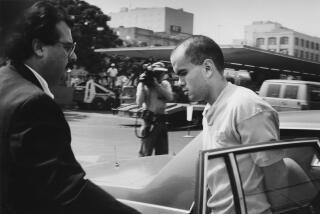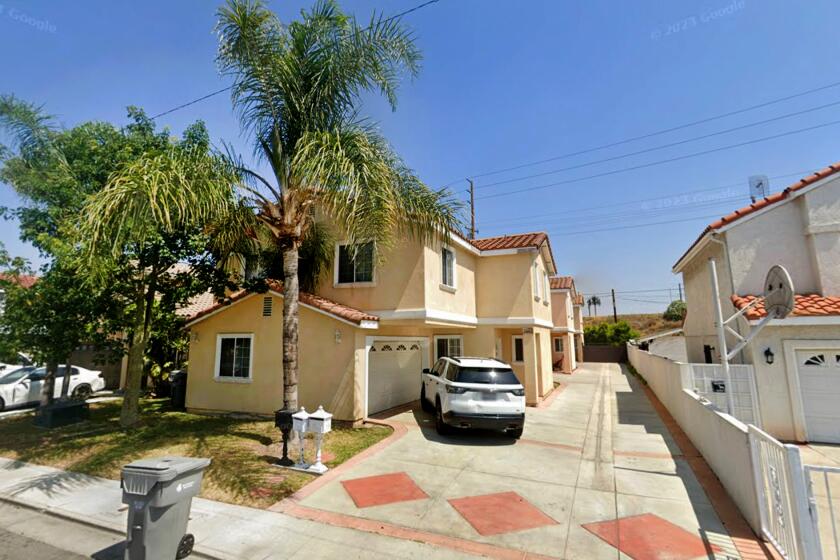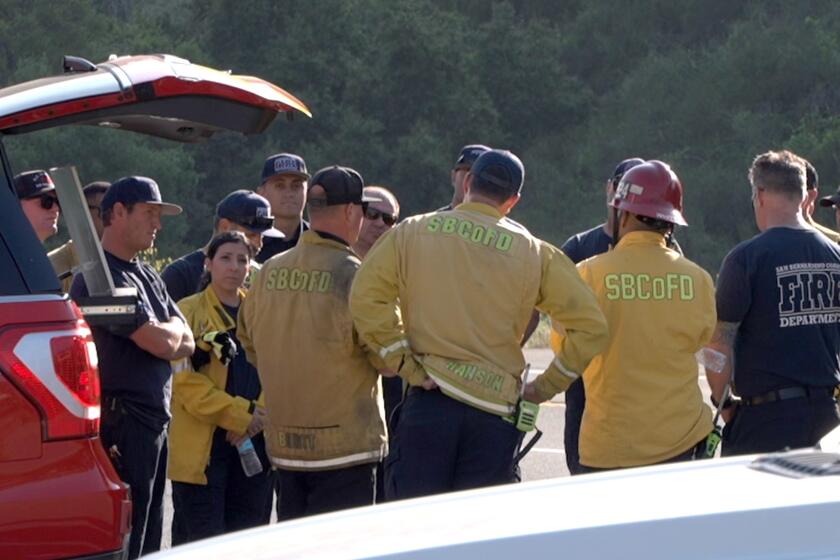D.A. Won’t Prosecute Kolender for Ticket-Fixing
Nearly five months after the San Diego County district attorney’s office began evaluating evidence of ticket fixing and other improprieties by Police Chief Bill Kolender, prosecutors have decided not to seek charges or even formally investigate the matter, sources have told The Times.
Kolender and Assistant Chief Bob Burgreen received written reprimands in November from City Manager John Lockwood for fixing traffic tickets for friends and relatives, and improperly using city employees and equipment for personal benefit.
The district attorney’s office, which began reviewing evidence furnished by Lockwood at the time of the Nov. 25 reprimands, recently concluded that Kolender and Burgreen should not be held directly responsible for dismissing parking and traffic tickets, according to sources close to the inquiry.
“The D.A. isn’t trying real hard to get this one in the bag,” said a law enforcement source familiar with the investigation. “The argument is that the cops didn’t fix the tickets, technically, but it was the judge or court clerk that fixed tickets by dismissing them on police recommendations. Of course, the judges didn’t know (that Kolender and Burgreen were improperly recommending the dismissal of tickets), and the clerks can’t be blamed. So there is no one to blame.”
Dist. Atty. Edwin Miller could not be reached for comment. On Wednesday, district attorney spokesman Steve Casey said that prosecutors were not ready to announce the results of their review.
Kolender said Wednesday that he agrees with the district attorney’s decision.
“I never thought there was anything criminally wrong with it in the first place,” he said.
Differs From L.A. County
The district attorney’s decision not to investigate Kolender or Burgreen differs substantially from those of prosecutors in Los Angeles County, who recently filed criminal charges in two cases involving allegations of ticket-fixing.
On Jan. 29, Beverly Hills Municipal Judge Charles D. Boags was charged with three misdemeanors, including conspiracy to obstruct justice, in connection with the improper suspension of fines during 1985 and 1986 on 207 parking tickets issued to his son and the young man’s friends at Beverly Hills High School. The Times disclosed last April that Boags had suspended fines on tickets issued to his son’s 1984 Honda.
Ralph Weldon, the former administrator of the Santa Anita Municipal Court, was charged with misdemeanor conspiracy last month for allegedly dismissing 73 traffic tickets for friends over a one-year period without consulting a judge.
If convicted, each man faces a maximum sentence of one year in jail and a $10,000 fine.
Richard Healey, the prosecutor assigned to both cases, said he believes the conspiracy charge could apply to police officials who improperly arrange for the dismissal of tickets.
“If you have a police officer or anybody else taking out tickets for no legitimate reason or for his friends, that arguably falls within the definition of interfering with the due administration of the laws,” said Healey, a Los Angeles County deputy district attorney.
San Diego County prosecutors learned about the criminal charges filed against Boags and Weldon from recent news stories.
“We’re certainly interested to see those cases and we’re aware of them,” Casey said in a recent interview. “They didn’t go unnoticed. They’re topical. But that’s all. Do they have a bearing on the ultimate decision? Ask me at the end of the review.”
Lockwood, after a two-week administrative review, found that Kolender and Burgreen had improperly dismissed tickets for friends and family. He also found that Kolender used a uniformed police officer and a police vehicle to run numerous personal errands over a three-year period, and that Burgreen used police video equipment on a fishing trip to tape a film segment for a local television project.
‘Boys Will Be Boys’
San Diego prosecutors have determined that the use of the officer and the equipment are a theft of city resources, but the amount is so small that it does not warrant prosecution, the sources told The Times. Regarding the seriousness of the theft, one source described the attitude of San Diego prosecutors as “boys will be boys and it happens all over the place.”
The district attorney’s decision probably will be reviewed by the state attorney general’s office, but the state office is unlikely to take any further action.
“The attorney general does not second-guess a prosecutor’s decision unless there has been an abuse of discretion by the attorney, which is exceedingly rare,” said Steve White, chief assistant attorney general.
Kolender told reporters in November that he was not worried about the district attorney’s inquiry. The police chief echoed similar statements when asked about the review during a recent interview.
“I’ve had lunch with Ed Miller several times and he never brought it up,” Kolender said.
Asked on Wednesday if he had ever lost sleep over the district attorney’s review, Kolender said, “My sleepless nights were prior to the city manager making any comment (in November). Once that was done, my position was that it was over and done with and I was going to go forward with my department. That’s what I’ve been trying to do.”
Allegations of improper police conduct were first raised in November when a monthlong Times investigation found that Kolender, Burgreen and other top police officials had improperly dismissed hundreds of parking tickets and dozens of traffic citations for relatives, friends, fellow police officials and influential businessmen since January, 1985. The police administrators had used fabricated or flimsy excuses, and in many cases traffic tickets were canceled without any investigation by the department.
Warned 2 Years Ago
Two years ago, an internal police audit had warned Kolender and his top assistants that tickets were being dismissed improperly.
Lockwood’s review found that Kolender improperly used former Officer Jeanne Taylor to run personal errands almost daily between 1980 and 1982. These errands ranged from picking up Kolender’s laundry to driving his children to doctor and dental appointments. Taylor wore a police uniform and was armed with a handgun while she was assigned to the chief’s office.
After his review, Lockwood announced new procedures that prohibit Kolender and his top aides from dismissing tickets. Under the new policy, only designated police administrators in the traffic division may authorize ticket dismissals, and only when citations are found to have been issued in error.
Lockwood said Wednesday that he was not surprised by the prosecutor’s decision not to investigate Kolender and Burgreen.
“When I sent it over, I didn’t see anything from my layman’s eye that caused me to believe there was anything of a criminal nature involved,” Lockwood said.
Kolender had dismissed parking and moving tickets for several friends and relatives including his wife, Lois, and son, Dennis; Conrad Burgreen, the assistant police chief’s uncle; Carl Sisskind, KFMB-TV (Channel 8) editorial director, and KSDO radio sportscaster Ronald Reina. Burgreen’s name appeared on numerous cancellation forms for motorists including his ex-wife; Kolender’s wife; the wife of San Diego Padres pitcher Rich Gossage; Sisskind; Reina, and Superior Court Judge James A. Malkus.
Kolender has insisted in numerous interviews that he did not “fix” tickets because the term implies that he received something of value in return for dismissing citations for his friends.
In the Los Angeles cases, however, there was no evidence that Boags or Weldon received any compensation for allegedly canceling tickets.
Los Angeles County prosecutor Healey said that Weldon, 34, who had worked in the Santa Anita courthouse for 17 years, fixed tickets “as a favor for his friends and acquaintances. I had the personal impression after talking with him that he wanted to impress his friends with his power and influence.”
Lockwood reached a similar conclusion about Kolender in the city manager’s 11-page report issued Nov. 25.
“Chief Kolender is a gregarious and popular person who likes to do things for people,” Lockwood wrote. “This is a strength. But it is also a weakness, as he is apt to assist individuals in instances where the chief of police should not.”
Times staff writer Ralph Frammolino contributed to this report.
More to Read
Start your day right
Sign up for Essential California for news, features and recommendations from the L.A. Times and beyond in your inbox six days a week.
You may occasionally receive promotional content from the Los Angeles Times.






